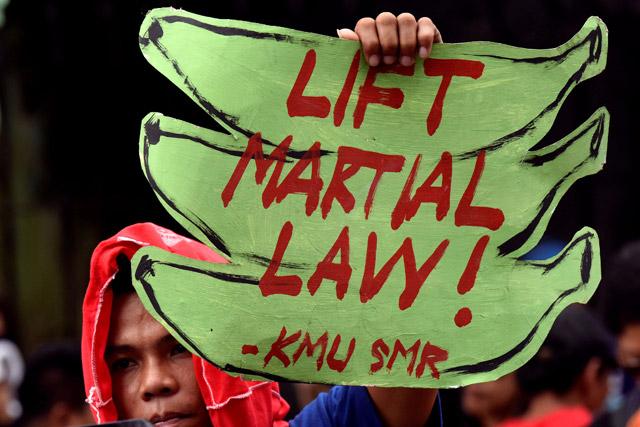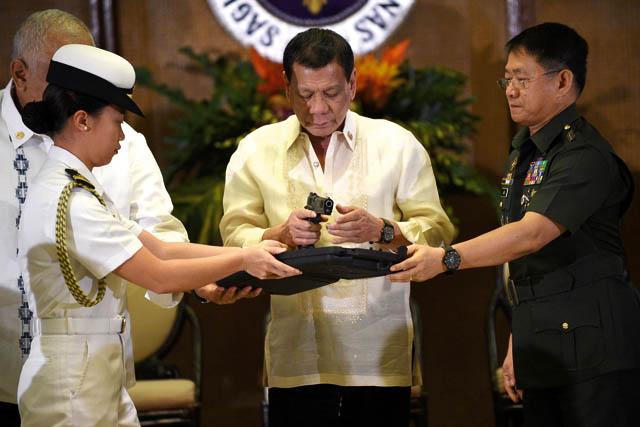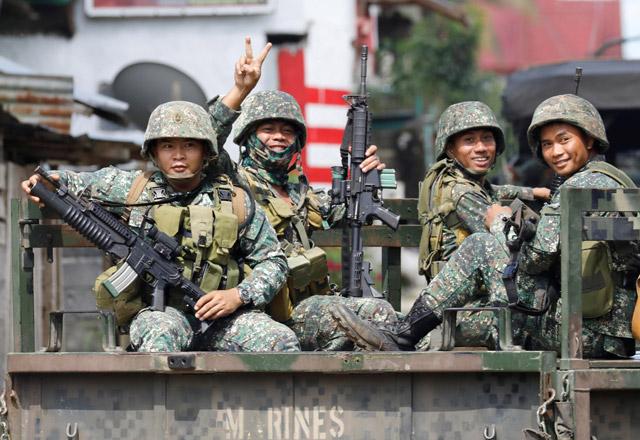You are here
Philippine Congress agrees to extend Mindanao martial law to end of year
By Reuters - Jul 22,2017 - Last updated at Jul 22,2017

An anti-martial law protester hold a placard while protesting during the special session on the extension of martial law at the House of Representatives in Quezon City, metro Manila, Philippines, on Saturday (Reuters photo)
MANILA — Philippine lawmakers on Saturday voted to retain martial law on the southern island of Mindanao until the end of the year, giving President Rodrigo Duterte more time to tackle armed extremists allied with the Daesh group.
Some 261 legislators agreed to extend military rule in a seven hour-long joint special session of the House of Representatives and the Senate, more than the required two-thirds of the house.
Security officials had told lawmakers that martial law was needed to stabilise a region where the Daesh terror group was gaining influence, and supporters could be inspired to stage uprisings in other areas of Mindanao, joined by foreign extremists.
Defence Secretary Delfin Lorenzana warned of more serious problems if the government did not have the powers to act swiftly.
"We need martial law because we haven't addressed yet the existence of other Daesh-inspired groups," he said, referring to another name for Daesh.
Duterte placed Mindanao under martial law on May 23 when heavily-armed militants belonging to the Maute and Abu Sayyaf groups along with foreign fighters stormed Marawi City, sparking the biggest security crisis of his presidency.
The battle to liberate Marawi continues two months after, with more than 420 militants, 100 soldiers and 45 civilians killed. Some of those were executed by the rebels, according to the military.
Government troops pulverised and retook some of the Maute strongholds after weeks of artillery attacks and air strikes, but an estimated 70 militants remained holed up in the downtown area.
"The rebellion in Marawi continues to persist and we want to stop the spread of the evil ideology of terrorism and free the people of Mindanao from the tyranny of lawlessness and violent extremism," Presidential Spokesman Ernesto Abella said in a statement.
But martial law remains a sensitive issue in the Philippines as it brings back memories of human rights abuses that occurred in the 1970s under the late dictator Ferdinand Marcos.
He was ousted in a "people power" revolt in 1986. Saturday's vote paves the way for the first ever extension of a period of martial law since the Marcos era.
Opponents expressed fears Duterte might eventually place the entire country under martial law, but the authorities have dismissed that.
Senator Franklin Drilon said the extension until end of the year was too long and Senator Risa Hontiveros, a staunch critic of Duterte, said martial law has "no strategic contribution to the military's anti-terrorism operations".
Congressman Edcel Lagman said there was "no factual basis" for martial law and that the siege in Marawi was terrorism, not rebellion.
Rebellion is one of the pre-conditions for declaring martial law under a 1987 constitution that was drafted to prevent a repeat of the Marcos era abuses.
Military chief General Eduardo General Aٌo said retaking Marawi has proven difficult because it was the first time troops had engaged in a "Mosul-type, hybrid urban warfare", referring to the fighting in the Iraqi city until recently held by Daesh.
Related Articles
MANILA — Philippine President Rodrigo Duterte on Tuesday asked Congress to extend martial law on the southern island of Mindanao until the e
MARAWI, Philippines — Philippine authorities on Tuesday warned extremist militants occupying parts of a southern city to surrender or die, a
MARAWI, Philippines — The Philippines military said on Monday it was close to retaking a southern city held for a seventh day by extremist m



















